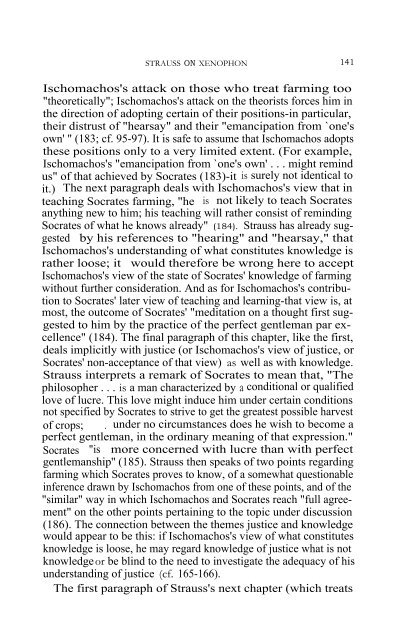Strauss on Xenophon's Socrates Xenophon's Socratic Discourse: An ...
Strauss on Xenophon's Socrates Xenophon's Socratic Discourse: An ...
Strauss on Xenophon's Socrates Xenophon's Socratic Discourse: An ...
Create successful ePaper yourself
Turn your PDF publications into a flip-book with our unique Google optimized e-Paper software.
STRAUSS ON XENOPHON<br />
Ischomachos's attack <strong>on</strong> those who treat farming too<br />
"theoretically"; Ischomachos's attack <strong>on</strong> the theorists forces him in<br />
the directi<strong>on</strong> of adopting certain of their positi<strong>on</strong>s-in particular,<br />
their distrust of "hearsay" and their "emancipati<strong>on</strong> from `<strong>on</strong>e's<br />
own' " (183; cf. 95-97). It is safe to assume that Ischomachos adopts<br />
these positi<strong>on</strong>s <strong>on</strong>ly to a very limited extent. (For example,<br />
Ischomachos's "emancipati<strong>on</strong> from `<strong>on</strong>e's own' . . . might remind<br />
us" of that achieved by <strong>Socrates</strong> (183)-it is surely not identical to<br />
it.) The next paragraph deals with Ischomachos's view that in<br />
teaching <strong>Socrates</strong> farming, "he is not likely to teach <strong>Socrates</strong><br />
anything new to him; his teaching will rather c<strong>on</strong>sist of reminding<br />
<strong>Socrates</strong> of what he knows already" (184). <str<strong>on</strong>g>Strauss</str<strong>on</strong>g> has already suggested<br />
by his references to "hearing" and "hearsay," that<br />
Ischomachos's understanding of what c<strong>on</strong>stitutes knowledge is<br />
rather loose; it would therefore be wr<strong>on</strong>g here to accept<br />
Ischomachos's view of the state of <strong>Socrates</strong>' knowledge of farming<br />
without further c<strong>on</strong>siderati<strong>on</strong>. <strong>An</strong>d as for Ischomachos's c<strong>on</strong>tributi<strong>on</strong><br />
to <strong>Socrates</strong>' later view of teaching and learning-that view is, at<br />
most, the outcome of <strong>Socrates</strong>' "meditati<strong>on</strong> <strong>on</strong> a thought first suggested<br />
to him by the practice of the perfect gentleman par excellence"<br />
(184). The final paragraph of this chapter, like the first,<br />
deals implicitly with justice (or Ischomachos's view of justice, or<br />
<strong>Socrates</strong>' n<strong>on</strong>-acceptance of that view) as well as with knowledge.<br />
<str<strong>on</strong>g>Strauss</str<strong>on</strong>g> interprets a remark of <strong>Socrates</strong> to mean that, "The<br />
philosopher . . . is a man characterized by a c<strong>on</strong>diti<strong>on</strong>al or qualified<br />
love of lucre. This love might induce him under certain c<strong>on</strong>diti<strong>on</strong>s<br />
not specified by <strong>Socrates</strong> to strive to get the greatest possible harvest<br />
of crops; . under no circumstances does he wish to become a<br />
perfect gentleman, in the ordinary meaning of that expressi<strong>on</strong>."<br />
<strong>Socrates</strong> "is more c<strong>on</strong>cerned with lucre than with perfect<br />
gentlemanship'' (185). <str<strong>on</strong>g>Strauss</str<strong>on</strong>g> then speaks of two points regarding<br />
farming which <strong>Socrates</strong> proves to know, of a somewhat questi<strong>on</strong>able<br />
inference drawn by Ischomachos from <strong>on</strong>e of these points, and of the<br />
"similar" way in which Ischomachos and <strong>Socrates</strong> reach "full agreement"<br />
<strong>on</strong> the other points pertaining to the topic under discussi<strong>on</strong><br />
(186). The c<strong>on</strong>necti<strong>on</strong> between the themes justice and knowledge<br />
would appear to be this: if Ischomachos's view of what c<strong>on</strong>stitutes<br />
knowledge is loose, he may regard knowledge of justice what is not<br />
knowledgeor be blind to the need to investigate the adequacy of his<br />
understanding of justice (cf. 165-166).<br />
The first paragraph of <str<strong>on</strong>g>Strauss</str<strong>on</strong>g>'s next chapter (which treats<br />
141

















